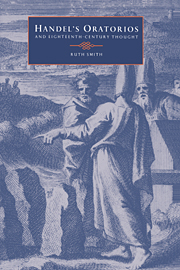Book contents
- Front Matter
- Contents
- Acknowledgements
- Abbreviations
- Introduction
- PART 1 ENGLISH ORIGINS OF ENGLISH ORATORIO
- Chapter 1 Artistic norms
- Chapter 2 The purpose of art
- Chapter 3 Music, morals and religion
- Chapter 4 The biblical sublime
- Chapter 5 The survival of epic
- Chapter 6 The defence of Christianity
- Chapter 7 Towards oratorio
- PART II THE PATRIOT LIBRETTO FROM THE EXCISE BILL TO THE JEW BILL: ISRAELITE ORATORIOS AND ENGLISH POLITICS
- Appendix I Libretto authors and sources
- Appendix 2 The oratorios and Methodism
- Notes
- Bibliography of sources cited
- Index
Chapter 3 - Music, morals and religion
Published online by Cambridge University Press: 22 September 2009
- Front Matter
- Contents
- Acknowledgements
- Abbreviations
- Introduction
- PART 1 ENGLISH ORIGINS OF ENGLISH ORATORIO
- Chapter 1 Artistic norms
- Chapter 2 The purpose of art
- Chapter 3 Music, morals and religion
- Chapter 4 The biblical sublime
- Chapter 5 The survival of epic
- Chapter 6 The defence of Christianity
- Chapter 7 Towards oratorio
- PART II THE PATRIOT LIBRETTO FROM THE EXCISE BILL TO THE JEW BILL: ISRAELITE ORATORIOS AND ENGLISH POLITICS
- Appendix I Libretto authors and sources
- Appendix 2 The oratorios and Methodism
- Notes
- Bibliography of sources cited
- Index
Summary
For those who wanted art to appeal to man's higher, rational, nature and engage the mind, music raised a constant problem: where it was not closely associated with comprehensible words it could smother rather than inform the understanding. The statement most frequently made about music in eighteenth-century England is that it is dangerous, because of its power over the emotions. Instrumental music, and music only loosely allied with words (as in extended melismas), is considered especially subversive because it stirs up emotions which drive out objective thought, and often, because of the indeterminate effect of instrumental music, the listener is confused even about what emotions it is evoking. The distress caused by such disturbance is perceptible in the literature of music, especially in comments on Italian opera:
Music, when purpose points her not the road,
Charms, to betray, and softens, to corrode.
Empty of sense, the soul-seducing art
Thrills a slow poison to the sick'ning heart.
For Hill, as for others, certain instruments, when used singly, beneficially stir up useful emotions (for example, the drum and trumpet inspire courage, see the passage quoted above, p. 78); but the ability of concerted instrumental music to infuse and overcome us with ‘unmanning’ emotions renders it deeply suspect. Professional musicians, and music lovers inclined to view human nature optimistically, might commend music without qualification, but they were a minority, and even they felt the need to justify music morally, as a civilising social influence.
- Type
- Chapter
- Information
- Handel's Oratorios and Eighteenth-Century Thought , pp. 81 - 107Publisher: Cambridge University PressPrint publication year: 1995



